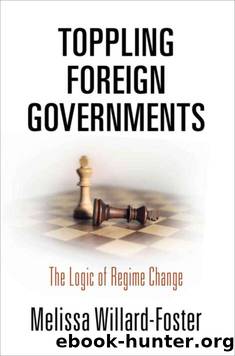Toppling Foreign Governments by Melissa Willard-Foster

Author:Melissa Willard-Foster [Willard-Foster, Melissa]
Language: eng
Format: epub
Publisher: University of Pennsylvania Press, Inc.
Published: 2018-11-18T18:30:00+00:00
The similarities among the Iraq and two Libya cases present another opportunity to control for several confounding variables, as illustrated in Table 13. In all three cases, the targeted leader was a secular personalist dictator who relied mainly on tribal, family, and clan support to maintain political power.5 Although democratic peace theory suggests that democracies are prone to conflict with authoritarian leaders, Qaddafi not only reached a deal with the United States in 2003, but he also continued to broker deals with Western democracies while reversing Libyaâs modest political reform.6 The time periods and issues in the 2003 cases are also similar. Both occurred in the aftermath of 9/11, when officials in the Bush administration were especially concerned about WMD and terrorism. Although Qaddafi had ceased his support for terror, Libya possessed chemical weapons and was developing a nuclear weapons program.7
The differences across the three cases allow for controls as well. Although Iraq had greater strategic significance to the United States, Libya was not more strategically valuable in 2011, when the United States pursued regime change, than it had been in 2003, when it did not. In addition, although it might be argued that the Bush administration negotiated with Libya simply because it could not afford another war, US forces were still actively engaged in Afghanistan when the Obama administration pursued regime change in Libya.8 Finally, while the same set of decision makers chose very different policies with respect to Iraq and Libya in 2003, two very different decision makers chose very similar policies in Iraq in 2003 and Libya in 2011. This suggests that understanding the decision to pursue regime change requires going beyond the personalities or ideologies of the particular policymakers involved.
These controls do not eliminate every possible alternative explanation. In this chapter, I test the dominant narratives of the decisions leading to the Iraq War, which focus on psychological and bureaucratic influences. I argue that these interpretations can help us answer a number of important questions, such as why tensions persisted between the United States and Iraq and why US relations with Qaddafi deteriorated. They are also helpful in understanding why officials in both the Bush and Obama administrations failed to anticipate the high costs of regime change. Where these approaches fall short, however, is in their ability to predict regime change. As I will show, psychological bias and bureaucratic pressure can neither explain why previous administrations pursued regime change in Iraq nor why the Obama administration pursued it in Libya. My theory helps flesh out our understanding of these cases by explaining why policymakers with very different views, biases, and decision-making styles ended up pursuing the same policy.
I also test the traditional rationalist approaches, which suggest US bargaining with Iraq and Libya broke down because each sideâs doubts about the other made an enforceable deal impossible. The incomplete-information problem suggests that Saddam and Qaddafiâs doubts about American threats caused them to resist, which led to their undoing. The credible-commitment problem indicates that at least one or both sidesâ distrust of the other made it impossible for them to conclude a deal.
Download
This site does not store any files on its server. We only index and link to content provided by other sites. Please contact the content providers to delete copyright contents if any and email us, we'll remove relevant links or contents immediately.
Einstein: His Life and Universe by Walter Isaacson(1311)
Finding Freedom: Harry and Meghan and the Making of a Modern Royal Family by Omid Scobie & Carolyn Durand(1173)
Promised Land (9781524763183) by Obama Barack(1151)
Compromised by Peter Strzok(1067)
Finding Freedom by Omid Scobie(1060)
JFK by Fredrik Logevall(990)
Freedom by Sebastian Junger(629)
Salford Lads: The Rise and Fall of Paul Massey by Bernard O'Mahoney(577)
The Russia House by John Le Carré(562)
Kremlin Winter by Robert Service(526)
Day of the Dead by Mark Roberts(513)
A World Ablaze by Craig Harline(505)
Graveyard (Ed & Lorraine Warren Book 1) by Ed Warren & Lorraine Warren & Robert David Chase(502)
Flying Tiger by Samson Jack(501)
Joe Biden: American Dreamer by Evan Osnos(490)
100 Things Successful Leaders Do by Nigel Cumberland(476)
Melania and Me: The Rise and Fall of My Friendship With the First Lady by Stephanie Winston Wolkoff(475)
The Irish Buddhist by Alicia Turner(469)
The Mission by David W. Brown(459)
